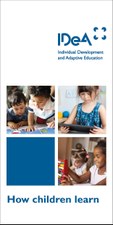The research project MORAL investigates the socio-moral development of children and adolescents with a strong focus on intergroup processes and social cognition. Another focus of the project is the training of educators and teachers regarding social exclusion among children and adolescents.
How can children receive optimal support in their development? What risks exist concerning their learning achievement, for example regarding children with learning disorders, ADHD or immigrant children? How do carers and teachers cope with the growing heterogeneity in children’s day-care institutions and schools? What learning measures are promising with respect to providing support to children that is adapted to their individual needs?
IDeA (Individual Development and Adaptive Education of Children at Risk) is an interdisciplinary research centre in Frankfurt/Main, founded in 2008 subject to funding from the LOEWE initiative by the federal state of Hesse. Its founding institutions are the DIPF | Leibniz Institute for Research and Information in Education, the Goethe University Frankfurt and the Frankfurt Sigmund-Freud-Institute. Members of the centre contribute their expertise from the fields of psychology, educational science, psycholinguistics, neuroscience, diverse subject didactics, sociology and psychoanalysis.
IDeA focuses on empirical studies of children at infancy, pre-school and primary school age who for different reasons – e.g. (neuro)cognitive or socio-emotional – bear a higher risk of impairment with respect to cognitive abilities required at school.
Research activities are carried out in three themes: Individual Development focuses on developmental and learning processes of children. Adaptive Education is concerned with the identification of children's specific living and learning conditions and determine the extent to which educational programmes take these contexts into consideration. Projects in the research theme of Professionalization explore the competencies, orientations, and attitudes of educators and teachers in daycare facilities, kindergartens, and elementary schools.
The IDeA lab offers its researchers facilities and personnel to support a wide variety of behavioral and neurocognitive studies.
The IDeA Centre is co-ordinated and administrated at the DIPF | Leibniz Institute for Research and Information in Education.
Scientific coordinator: Prof. Dr. Florian Schmiedek
Head of IDeA coordination: Dr. Jeanette Ziehm
Head of IDeA lab: Dr. Björn Rump
Selected IDeA projects at DIPF
The Project MotivO aims at investigating and comparing motivational aspects of reading achievement across orthographies (German vs. Hebrew). Within the context of a cooperation project, German and Israeli 2nd and 4th Graders will be compared regarding their reading motivation and reading achievement in a cross-language research design to detect positive or negative feelings towards reading as well as changes across time.
The project aims to investigate the effectiveness of teaching units for primary school science classrooms which integrate the use of digital media. In this scope, we examine (1) whether the digital media can be used effectively to support science learning as well as to activate self-regulation of learning, and (2) whether the additional implementation of adaptive elements can particularly support at risk students.
The project PERLE investigates whether computer-based promotion of mathematical competencies leads to an improvement in recognition skills and to increased and elaborated action planning among early childhood educators.
This project evaluates the potential of asking students to generate predictions to improve their learning. Further, it investigates the mechanisms that determine its success and asks whether there are age-related differences in its effectiveness.
The PROMPT project focuses on developing an evidence-based, child-friendly prototype of a learning planner app that supports school children in self-regulated learning with digital media. The final version of the prototype will be made openly accessible for widespread use.
The PuS-SeL project investigates components, influence factors and approaches to promote self-regulation of learning among primary school children.
The project RABE 2 examines the persistence and the psychosocial consequences of scholastic learning disabilities from primary school age up to young adulthood. The study focusses risk factors and consequences of learning disorders but will also look at participant’s coping strategies.
The project SchuWaMi examines how schools in Germany have reacted to the increased reception of refugee children and youths, which institutional changes have taken place and are still taking place in this context. It also looks at whether and how schools succeed in promoting the social participation of children and youths with a refugee background.
The project Stereo-Disk investigates how stereotypes of teachers in inclusive school contexts affect students' assessments and develops support formats to reduce their influence.
The project Stereo-no-GO examines inequalities based on gender and origin in the STEM fields and in programs for gifted children.
The project UPWIND investigates relations among affective, motivational, and cognitive processes in students. The aim is to develop easy to implement interventions tailored to individual children by targeting differences in these processes between children.
The WieSeL project deals with the self-regulatory competence of teachers. The focus is on identifying which aspects of teacher competence support teachers’ promotion of self-regulation of learning among their students.
The project zEbra examines the associations between the use of social media and well-being among children and adolescents. Measuring instruments are being developed that validly assess smartphone use of different social media platforms and the social interactions that take place online.
- 1
- 2
